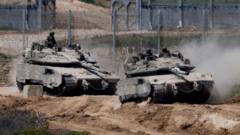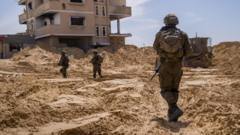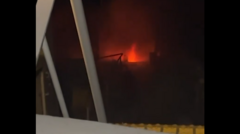In a significant escalation of regional hostilities, Israeli Prime Minister Benjamin Netanyahu has vowed retaliation following a missile strike by the Houthi movement that landed near Ben Gurion Airport. The missile, which originated from Yemen, hit close to the main terminal on Sunday morning, injuring six individuals, though none seriously. Netanyahu, in a social media statement, reiterated Israel's commitment to strike back, emphasizing that past actions will inform future military responses.
Israel Prepares for Retaliation After Houthi Missile Strike Near Ben Gurion Airport

Israel Prepares for Retaliation After Houthi Missile Strike Near Ben Gurion Airport
Israeli Prime Minister Benjamin Netanyahu promises a forceful response to Houthi missile attacks targeting Israel's major airport, heightening regional tensions.
The missile incident occurred as emergency services reported the injuries sustained by four victims from the blast, and two others while rushing to safety. Additionally, the Houthi leadership announced plans to enforce a "comprehensive aerial blockade" on Israel to counter alleged Israeli military expansions in Gaza. Israel's defense minister warned that any aggressions against the nation would elicit stronger retaliation, and Netanyahu indicated that the origins of such attacks, linked to Iran, would be addressed at a calculated time.
Reports surfaced that despite multiple defense systems—including Israel's Arrow and a US-supported Thaad battery—failing to intercept the missile, flights resumed at Ben Gurion Airport after a brief suspension, although key airlines like Lufthansa and Delta opted to cancel operations for the day. The Israeli Air Force has initiated an inquiry into the interception failure. Safety sirens activated as the missile approached, with local authorities swiftly investigating the aftermath, including a notable crater indicative of the impact.
Netanyahu is expected to convene with his ministers and military heads shortly to deliberate on the strategic response to this aggression from the Houthis, who have a history of missile advancements and maritime attacks aimed at Israel, often in alignment with the political developments in Gaza. The complexities of the situation highlight the ongoing tension between Israel, Iran, and their respective allies in the region.
Reports surfaced that despite multiple defense systems—including Israel's Arrow and a US-supported Thaad battery—failing to intercept the missile, flights resumed at Ben Gurion Airport after a brief suspension, although key airlines like Lufthansa and Delta opted to cancel operations for the day. The Israeli Air Force has initiated an inquiry into the interception failure. Safety sirens activated as the missile approached, with local authorities swiftly investigating the aftermath, including a notable crater indicative of the impact.
Netanyahu is expected to convene with his ministers and military heads shortly to deliberate on the strategic response to this aggression from the Houthis, who have a history of missile advancements and maritime attacks aimed at Israel, often in alignment with the political developments in Gaza. The complexities of the situation highlight the ongoing tension between Israel, Iran, and their respective allies in the region.





















